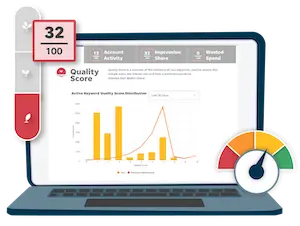Last week, the judge in the Google antitrust trial ruled that the company has illegally monopolized web search. Legal and tech experts are calling it a historic win for the Department of Justice and a sign of even bigger upheavals to come for search and big tech.
But what does the ruling portend for those of us at ground level—the marketers and small business owners who rely on Google to connect us with the customers who support our businesses?
Today, we’ll explain how we got to this point, what comes next, and share what a few experts believe will be the most likely effects this case will have on small businesses and search advertisers.
Contents
- A brief background of the Google antitrust case
- The ruling and its potential impacts
- What does this mean for small businesses?
A brief background of the Google antitrust case
In 2020, the US Justice Department, along with several US states, filed an antitrust case against Google, alleging that it illegally monopolized online search and advertising.
At the heart of the suit are agreements Google entered with companies like Apple and Samsung to make its search engine the default on various mobile devices and internet browsers. Those agreements, said the DOJ in its complaint, helped Google become “a monopoly gatekeeper for the internet, and one of the wealthiest companies on the planet.”
![]()
The 10-week trial kicked off in September of 2023 and included testimonies from Google, Microsoft, and Apple, among many others. US District Judge Amit Mehta delivered his ruling on August 5.
The ruling and its potential impacts
Judge Mehta ruled that Google’s default agreements created a monopoly on online search and advertising—which have, in turn, blocked competition and throttled innovation. “The distribution agreements have caused a third key anticompetitive effect: They have reduced the incentive to invest and innovate in search,” he said in his ruling.
In 2022, for example, Google paid Apple $20 billion to maintain its spot as the default search engine for iOS devices. “Sure, users can access Google’s rivals by switching the default search access point or by downloading a rival search app or browser. But the market reality is that users rarely do so,” Judge Mehta concluded.
The ruling in this trial is step one. Next up is a September 6 hearing to decide what changes and penalties to impose. Those penalties could include restricting Google’s agreements with Apple and other device or browser makers to allow other search engines to compete for those prime placements. Or Judge Mehta could decide to break Google up in some way, siloing pieces of the business into smaller entities.
Google has the opportunity to appeal the decision, which it says it plans to do. A potentially lengthy appeals process means it could be a while before we know the final outcome. “At this time, the full impacts on search are unknown, and it could take a few years to fully see changes. But experts are predicting the ruling ‘could change how we use the internet and search for information,’” USA Today reported.
What does this mean for small businesses?
It could be years before we know the full impact of the ruling. But early reactions from industry experts suggest that it’s positive news for small businesses and search engine users.
Users and advertisers will have more search engine options
One of the more likely outcomes is that smartphones and web browsers will need to offer a range of search engines to users—especially when those systems are first initiated. That could lead to more overall investment in improving search and make way for new upstarts to join the search engine market.

US Android users could see a search engine choice screen on device startup, similar to the screen shown to European Android users.
“I do think it will open the door for more search platforms to have a fighting chance in more places, like on Apple devices, for example,” said Tony Testaverde, VP of Marketing Growth and Analytics at LocaliQ. “And it may open the door for more companies to invest in their own search engine.” Apple, for example, has toyed with the idea of building a search product to compete with Google, much the way it did with Apple Maps.
That last part is key since Judge Mehta specifically called out the reduced “incentive to invest and innovate in search.” And while even Apple believes Google is the best search engine currently, the carrot of greater access may prove to be the push Microsoft and others need to spend on innovation.
Brett McHale, a paid media marketing expert and the founder of Empiric Marketing, said the market is ready for more competitors and a more competitive search engine from Google. “Many people both within and outside of the industry have seen a deterioration in the quality of the search engine over the past few years,” he said. “Google has rolled out so many SEO updates that it has become nearly impossible for smaller domains to rank effectively while simultaneously trying not to get penalized for once-accepted practices.”
The ruling cracked an opening in the search engine market, creating an opportunity for new players to compete against Google’s core product, said Katia Hausman, Vice President of Product Management at LocaliQ. “The full impact of the court’s decision on the search industry remains to be seen. However, it’s likely to stimulate innovation beyond vertical search, where Google is already facing competition from Amazon and AI services. We could witness the emergence of new general search engines, leading to a more competitive market.”
McHale also believes that loosening the competitive constraints could help AI-powered search flourish. “Companies like OpenAI and Meta have made great strides in that domain [AI-powered search] while Google has attempted to play catch-up with underwhelming results. We may see more competitors as a result, perhaps on the search engine side but I would anticipate more hybrid AI/search-related products to enter the space.”
Lower advertising costs
During testimony, a Google ad executive admitted that Google manipulated its ad auction process in a way that potentially increased prices by 5% for the typical advertiser and as much as 10% for some queries. While the search engine giant’s average cost per click has increased, other advertising platforms like Facebook have seen ad costs go down or stay flat.

Google ads costs continue to increase, as noted in our 2024 Google Ads Benchmarks Report.
McHale said one of the best outcomes for small businesses could be lower ad prices—or at least an end to the trend of ever-increasing costs.“We could see a drop in ad prices, or something similar to what happened to Google Shopping in 2017 in the EU—due to a similar ruling—where third-party comparison shopping services were given a 20% discount on CPCs. In time, the landscape may improve considerably for small businesses with more opportunities and lower costs to advertise.”
Cliff Sizemore, a senior marketing manager at LocaliQ, agreed while noting that this is just one piece of a bigger picture. “I hope it will lower advertising costs and provide opportunities on different platforms, which would be a plus for small businesses,” he said. “There’s another trial on September 9 that covers Google’s ad tech, so we will be interested to see what comes of that.”
There could be increased pressure on each search engine to make its offering more attractive to advertisers. “End of the day, advertisers will always go back to where they are getting the highest ROI,” Testaverde said. “Open ad cost competition will give more companies a chance to get their foot in the door. But the platforms and products need to prove profitable to businesses, or the dollars will eventually flow back to Google.”
Diversifying ad spend becomes more important than ever
With more search engine options for users comes more viable advertising platforms for small businesses. If more people use Google alternatives to find brands and products, small businesses will need to invest some of their marketing dollars in them to capture those leads.
“Diversifying ad spend across multiple platforms is a wise strategy for small businesses, even without Google’s monopoly case,” Hausman said. “This approach can yield better results by mitigating risks, lowering costs, and expanding reach. The potential changes in the search landscape due to the antitrust case make this strategy even more critical.”
Look for cross-platform advertising solutions and technology to become more important in the coming months and years as small businesses search for ways to maximize their returns from new advertising networks.





![Search Advertising Benchmarks for Your Industry [Report]](https://www.wordstream.com/wp-content/uploads/2024/04/RecRead-Guide-Google-Benchmarks.webp)



Comments
Please read our Comment Policy before commenting.